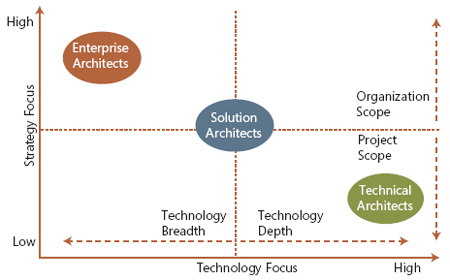Over the years I’ve had various jobs which have been basically the same role but with different job titles. Officially, I’ve been a Consultant, Senior Consultant, Project Manager, Senior Technical Consultant, Senior Customer Solution Architect (which would have been a Principal Consultant in the same organisation a few years earlier but management swapped the “architect” word for a drop in implied seniority) but if you ask me what I am, I tend to say I’m an infrastructure architect.
Issue 15 of The [MSDN] Architecture Journal included an article about becoming an architect in a systems integrator. I read this with interest, as that’s basically what I do for a living (believe me, I enjoy writing about technology but it will be a long while before I can give up my day job)!
The Architecture Journal tends to have an application focus (which is only natural – after all, it is produced by developer-focused group in a software company) and I don’t know much about application development but I do know how to put together IT solutions using common off the shelf (COTS) applications. I tend to work mostly with Microsoft products but I’ve made it my business to learn about the alternatives (which is why I’m a VMware Certified Professional and an Red Hat Certified Technician). Even so, I’m stuck at a crossroads. I’m passionate about technology – I really like to use it to solve problems – but I work for a managed services company (an outsourcer in common parlance) where we deliver solutions in the form of services and bespoke technology solutions are not encouraged. It seems that, if I want to progress in my current organisation, I’m under more and more pressure to leave my technical acumen behind and concentrate on the some of the other architect’s competencies.
I’m passionate about technology – I really like to use it to solve problems
I understand that IT architecture is about far more than just technology. That’s why I gained a project management qualification (since lapsed, but the skills are still there) and, over the years, I’ve developed some of the softer skills too – some which can be learnt (like listening and communications skills) – others of which only come with experience. I think it’s important to be able to dive into the technology when required (which, incidentally, I find helps to earn the respect of your team and then assists with the leadership part of the architect’s role) but just as important to be able to rise up and take a holistic view of the overall solution. I know that I’m not alone in my belief that many of the architects joining our company are too detached from technology to truly understand what it can do to address customers’ business problems.

OK, so I’m a solutions architect who can still geek out when the need arises. I’m still a way off becoming an enterprise architect – but do I really need to leave behind my technical skills (after having already dumped specialist knowledge in favour of breadth)? Surely there is a role for senior technologists? Or have I hit a glass ceiling, at just 36 years of age?
I’m hoping not – and that’s why I’m interested in the series of webcasts that Microsoft Consulting Services are running over the next few months – MCS Talks: Enterprise Architecture. Session 1 looked at infrastructure architecture (a recorded version of the first session is available) and future sessions will examine:
- Core infrastructure.
- Messaging.
- Security and PKI.
- Identify and access management.
- Desktop deployment.
- Configuration management.
- Operations management.
- SharePoint.
- Application virtualisation.
As should be expected, being delivered by Microsoft consultants, the sessions are Microsoft product-heavy (even the session titles give that much away); however the intention of the series is to connect business challenges with technology solutions and the Microsoft products mentioned could be replaced with alternatives from an other vendors. More details on the series can be found on the MCS Talks blog.
This might not appeal to true enterprise architects but for those of us who work in the solution or technical architecture space, this looks like it may well be worth an hour or so of our time each fortnight for the rest of the year. At the very least it should help to increase breadth of knowledge around Microsoft infrastructure products.
And, of course, I’ll be spouting forth with my own edited highlights on this blog.

There are some interesting points of view expressed in this forum thread about calling yourself an architect.
Looking back, I can tell that the Microsoft series on Enterprise Architecture I referred to had very little to do with Enterprise Architecture as I recognise it today!
Hi Mark, Very interesting article. Will come back after going through your first session
Unfortunately (but as is so often the way with old blog posts like this), the links I provided are now out of date; however I still stand by many of the points in this post!
Hi Mark, so what can I focus on in order to become an Infrastructure Architect. I am currently a Network Technician with a little bit of administration.